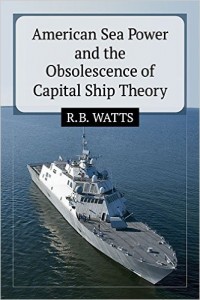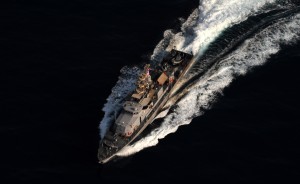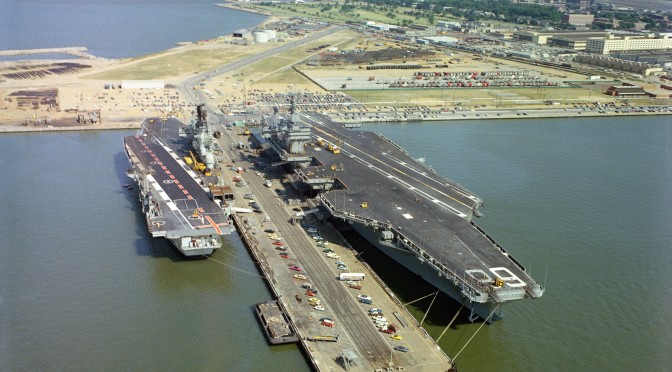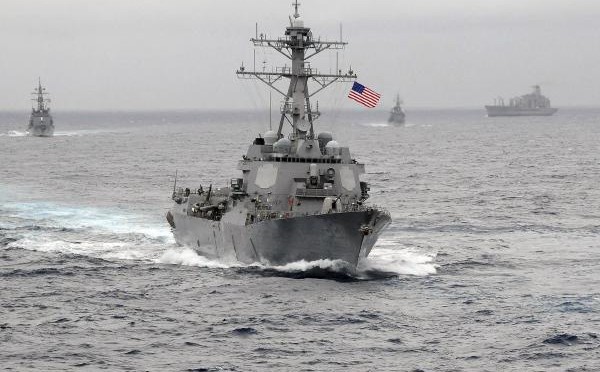The United States is over-invested in large-scale capital ships that are a liability in this new age of irregular warfare. That is the premise behind the upcoming book, American Sea Power and the  Obsolescence of Capital Ship Theory by R.B. Watts. Watts, a retired Captain in the United States Coast Guard, says that this text is a culmination of 30 years of research and observation. He does not rule out the possibility of conventional war between states; instead, he emphasizes the greater likelihood of irregular conflict and the Navy’s need to prepare for these types of conflicts. The book itself separates into three distinct sections: a historical analysis of predominant theories and their alternatives; an examination of the evolution since the Cold War; and an assessment of the new requirements of irregular warfare.
Obsolescence of Capital Ship Theory by R.B. Watts. Watts, a retired Captain in the United States Coast Guard, says that this text is a culmination of 30 years of research and observation. He does not rule out the possibility of conventional war between states; instead, he emphasizes the greater likelihood of irregular conflict and the Navy’s need to prepare for these types of conflicts. The book itself separates into three distinct sections: a historical analysis of predominant theories and their alternatives; an examination of the evolution since the Cold War; and an assessment of the new requirements of irregular warfare.
Watts does an admirable job of covering the historical basis for his theory. He begins with a detailed explanation of A.T. Mahan and his prevailing theory on the importance of the large scale capital ship fleet. He next explores the ascendancy, use, and effectiveness of the capital ship. From the dreadnought, to the battleship, to the fleet  carrier, all the way to the nuclear super carrier, he examines the use and effectiveness of each in their prevailing conflict. During the Cold War, the Western policy of containment was a boon for navalists wedded to Mahanian theory. Containment implies encirclement and encirclement of the Soviet Union by sea was a major part of the NATO response. The capital ship theory though did not fit into the new paradigm. Vietnam and the Reagan reforms of the 1980’s were a strategic negative and positive for the Navy respectively.
carrier, all the way to the nuclear super carrier, he examines the use and effectiveness of each in their prevailing conflict. During the Cold War, the Western policy of containment was a boon for navalists wedded to Mahanian theory. Containment implies encirclement and encirclement of the Soviet Union by sea was a major part of the NATO response. The capital ship theory though did not fit into the new paradigm. Vietnam and the Reagan reforms of the 1980’s were a strategic negative and positive for the Navy respectively.
Where he truly does excel is looking at the modern naval implications after 9/11. During the Global War on Terror naval air power was used to great effect in the beginning of ENDURING FREEDOM. It was used so successfully that the pilots soon ran out of targets. New developments have come to bear in the last decade. The Littoral Combat Ship, a small “streetfighter” designed to operate in the littorals and close to shore, has now been re-purposed to fight with the blue-water fleet. This led to massive cost overruns and concerns over survivability. China has risen to fill the gap left by the Soviet Union in capital ship theory. Coming from the GWOT and the threat of China, was the concept of “jointness”. The idea is that by working together and collaborating, the force can be more efficient and relevant to irregular and regular missions. “Air-Sea Battle” announced in 2011 codified “jointness”, bringing with it capital ship theory at the forefront. He concludes that the United States must change its objectives to meet the new challenges of irregular war. As long as the United States remains a superpower, it should expect to be challenged using irregular methods.
American Sea Power and the Obsolescence of Capital Ship Theory is a noteworthy entry into an area that is rarely explored, the risk of over-reliance on capital ships in the United States Navy. The experience of the author and his meticulous research truly shows through the pages. His exploration of the Cyclone-class patrol craft,  the LCS, and the need for a small surface combatant designed for operations in the littoral is quite compelling. The Navy is sorely missing a patrol craft that can operate on presence missions in the South China Sea, Persian Gulf, the Caribbean, and the Mediterranean. One area that is missing is the lack of the contributions of PT boats in the Second World War. Captain Watts’ book is a worthwhile read for anyone in the sea service and those interested in alternatives to current trends within the US Navy.
the LCS, and the need for a small surface combatant designed for operations in the littoral is quite compelling. The Navy is sorely missing a patrol craft that can operate on presence missions in the South China Sea, Persian Gulf, the Caribbean, and the Mediterranean. One area that is missing is the lack of the contributions of PT boats in the Second World War. Captain Watts’ book is a worthwhile read for anyone in the sea service and those interested in alternatives to current trends within the US Navy.
American Sea Power and the Obsolescence of Capital Ship Theory will be released on 15 November 2015.
David Roush received his Master’s degree in National Security Affairs emphasizing naval affairs from the Institute of World Politics. He also holds a bachelor’s degree from Western Michigan University in Political Science. David currently serves as CIMSEC’s Director of Content Management.




